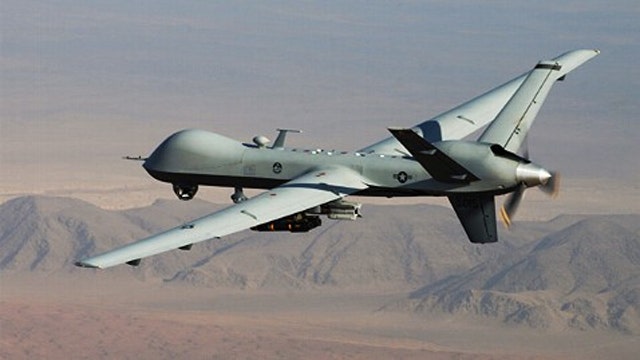CIA, Special ops launch drone war against ISIS in Syria
Drone program independent of U.S.-led coalition
The drone strike that killed ISIS' most notorious online recruiter in Syria last week was part of a stepped-up effort by the CIA and U.S. Special Operations forces to target and eliminate senior members of the terror group, according to a published report.
The Washington Post, citing U.S. officials, reported Tuesday that the collaborative effort has been responsible for "several" recent strikes against senior ISIS operatives deemed "high-value targets." The program's most notable success has been the death of Junaid Hussain, a British-born computer hacker who used social media in an effort to inspire homegrown jihadists to commit terror attacks.
The reported program is independent of airstrikes carried out in Syria by a U.S.-led coalition, which has the aim of dislodging ISIS from the swath of territory it captured in Iraq and Syria last year. A recent U.S. intelligence assessment concluded that conventional airstrikes had done little to affect ISIS' manpower or territorial footprint.
The Post reported that the targets of the drone strikes had been identified by the CIA's Counterterrorism Center (CTC), while the actual missions were being carried out by the Joint Special Operations Command (JSOC). According to the paper, the drone strikes constitute a fraction of the more than 2,450 strikes conducted in Syria over the past 12 months. An additional 4,000 airstrikes have targeted ISIS in Iraq.
The arrangement between the CTC and JSOC is an apparent response to President Obama's effort to shift responsibility for drone missions from the CIA to the Pentagon. The CIA had previously been known to conduct drone strikes in Pakistan as well as in Yemen, where it did so alongside the military. Earlier this year, it was reported that Obama waived the CIA's Pakistan drone strikes from rules requiring that the agency prove the target posed an imminent threat to America.
The Post reports that the strikes are being carried out under the military's post-9/11 authority to pursue Al Qaeda rather than a specific presidential directive to the CIA, which means the drones can only be operated under JSOC authority.
U.S. officials tell the paper there is no plan to impose the Syria-style arrangement on the agency's drone missions in Pakistan or Yemen, but they did say the model could be used in future conflicts. Syria is technically a "denied" country for the CIA, which means the agency has no established presence there. The U.S. also has no acknowledged military personnel in the county, though members of Delta Force killed ISIS leader Abu Sayyaf and captured his wife in an overnight raid in Syria this past May.





